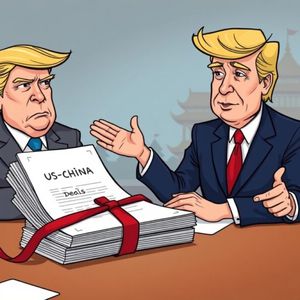US-China Deals: Trump’s Crucial Approval Shapes Future Economic Landscape
9 min read
BitcoinWorld US-China Deals: Trump’s Crucial Approval Shapes Future Economic Landscape In a development that has sent ripples across global financial markets and diplomatic circles, reports from Walter Bloomberg on X indicate a significant shift in the landscape of international relations. U.S. Treasury Secretary Scott Bessent has reportedly stated that any future pauses or agreements concerning US-China deals will be contingent upon the direct approval of U.S. President Donald Trump. This declaration underscores the highly centralized nature of foreign policy decisions and could profoundly impact trade, investment, and geopolitical stability for years to come. For anyone invested in the interconnected global economy, especially the dynamic world of cryptocurrencies, understanding the implications of such a statement is not just prudent—it’s essential. What Does Trump’s Approval Mean for US-China Deals? The statement from Secretary Bessent, if it holds true, signals a clear intent to consolidate power regarding critical international negotiations. Under a potential Trump administration, the focus on direct presidential oversight would likely intensify, reflecting a continuation of the ‘America First’ doctrine seen in his previous term. But what does this level of direct approval truly entail for the intricate dance of US-China deals ? Centralized Decision-Making: It implies that major economic and trade agreements will bypass extensive bureaucratic processes, landing directly on the President’s desk for a final say. This can lead to faster, albeit potentially less predictable, outcomes. Leverage and Negotiation: Trump’s well-known negotiating style often involves high-stakes brinkmanship. Requiring his direct approval for US-China deals means every agreement will be viewed through the lens of maximizing American advantage, potentially leading to more aggressive tactics. Reduced Flexibility: While direct oversight can streamline some processes, it might also reduce the flexibility of negotiators to find common ground, as any deviation from the President’s explicit directives would be challenging. Political Imperatives: Decisions on US-China deals would likely be heavily influenced by domestic political considerations and the President’s broader strategic objectives, rather than purely economic rationales. This approach stands in contrast to more traditional diplomatic processes where various departments and agencies play significant roles in shaping and executing foreign policy. The emphasis on presidential approval elevates the personal mandate of the leader above all else, creating a unique dynamic for future US-China deals . A Glimpse into the Past: Trump’s Previous Stance on US-China Deals To truly grasp the weight of Bessent’s statement, it’s vital to recall the tumultuous history of US-China deals during Trump’s first presidency. His tenure was marked by an aggressive stance towards Beijing, characterized by a significant trade war, imposing tariffs on hundreds of billions of dollars worth of Chinese goods. This period was not just about trade imbalances; it was a broader challenge to China’s economic practices, intellectual property theft, and state subsidies. Key moments included: Tariff Imposition: Starting in 2018, the U.S. levied tariffs on a wide range of Chinese imports, prompting retaliatory tariffs from China. This created significant uncertainty for global supply chains and businesses. Phase One Trade Deal: Signed in January 2020, this agreement aimed to de-escalate tensions, with China committing to purchase an additional $200 billion in U.S. goods and services over two years. However, many of these commitments were not fully met. Technology Restrictions: Beyond trade, the Trump administration also took steps to restrict Chinese technology companies like Huawei and TikTok, citing national security concerns. Currency Manipulation Accusations: China was briefly labeled a currency manipulator by the U.S. Treasury, a designation later reversed. This historical context suggests that any future US-China deals under Trump’s direct approval would likely continue this assertive, confrontational approach, prioritizing American economic interests and national security above all else. The lessons learned from the previous trade war—its impact on global markets, supply chains, and specific industries—will undoubtedly inform future negotiations. Economic Ripple Effects: How Will Global Markets Respond to Such US-China Deals? The prospect of a highly centralized approval process for US-China deals sends clear signals to global markets. Uncertainty is often the enemy of stability, and the potential for abrupt shifts in policy can trigger significant reactions. Consider the following: Market Sector Potential Impact Reasoning Stock Markets Increased volatility, sector-specific impacts (tech, manufacturing). Tariff threats, supply chain disruptions, and geopolitical tensions directly affect corporate earnings and investor confidence. Commodities Fluctuations in demand for raw materials (e.g., oil, agricultural products). China is a major consumer; trade disputes can alter demand patterns. Currencies Yuan and Dollar volatility, potential for currency manipulation accusations. Trade imbalances and economic policy shifts directly influence exchange rates. Supply Chains Further diversification away from China, ‘friend-shoring’ initiatives. Businesses seek to reduce reliance on single countries due to political risk. Businesses, particularly those with significant exposure to both the U.S. and Chinese markets, will need to re-evaluate their strategies. This could mean accelerating efforts to diversify manufacturing bases, re-shoring certain operations, or investing more heavily in automation to mitigate labor and geopolitical risks. The focus will shift from global optimization to resilience and national security considerations, directly influencing the nature of future US-China deals . The Geopolitical Chessboard: Beyond Just US-China Deals While the immediate focus is on US-China deals , the implications of such a centralized approval process extend far beyond bilateral trade. The relationship between the world’s two largest economies has profound geopolitical ramifications, affecting alliances, international organizations, and the global balance of power. Impact on Allies: U.S. allies in Asia (e.g., Japan, South Korea) and Europe will closely watch how Washington navigates its relationship with Beijing. A highly assertive U.S. stance might pressure allies to choose sides, potentially fragmenting global economic blocs. International Institutions: Organizations like the World Trade Organization (WTO) could see their influence further diminished if bilateral agreements, dictated by presidential approval, become the norm. This could lead to a less rules-based international order. Technological Competition: The battle for technological supremacy, particularly in areas like AI, quantum computing, and semiconductors, will intensify. Direct presidential approval could mean more aggressive policies to curb China’s technological advancement and protect U.S. innovation. Regional Stability: Issues such as Taiwan, the South China Sea, and human rights will remain contentious. Any US-China deals will likely be intertwined with these sensitive geopolitical issues, making negotiations even more complex. This dynamic creates a complex geopolitical chessboard where every move in the economic sphere has a corresponding strategic implication. Nations will need to carefully calibrate their own foreign policies in response to this evolving U.S.-China dynamic. What Do These Developments Mean for the Crypto World? While US-China deals might seem distant from the decentralized world of cryptocurrencies, the truth is that macro-economic and geopolitical shifts profoundly impact digital asset markets. Here’s how: Market Volatility: Increased uncertainty in traditional markets due to trade tensions or geopolitical friction often spills over into crypto. Investors may seek safe havens (like Bitcoin, sometimes) or liquidate risk assets, leading to price swings. Regulatory Landscape: A more nationalistic economic policy could lead to stricter domestic crypto regulations, as governments seek to control capital flows and prevent circumvention of sanctions or trade barriers. Conversely, some might see crypto as a way to bypass traditional financial systems. Innovation and Adoption: Geopolitical tensions can both hinder and accelerate innovation. While some might fear regulatory crackdowns, others might see an increased need for decentralized, censorship-resistant technologies, potentially boosting adoption in certain regions. CBDCs and Digital Yuan: The U.S.-China economic rivalry could intensify the race for Central Bank Digital Currencies (CBDCs). China’s digital yuan could become a tool in its economic strategy, prompting the U.S. to accelerate its own digital dollar initiatives, potentially influencing global financial architecture. The crypto market, despite its independent ethos, remains part of the broader global financial ecosystem. Major shifts in U.S.-China relations will undoubtedly create new challenges and opportunities for digital assets, requiring investors and innovators to remain vigilant and adaptable. Navigating the Future: Challenges and Opportunities in US-China Deals The path forward for US-China deals under direct presidential approval is fraught with both challenges and potential opportunities. Understanding these dual aspects is crucial for businesses, investors, and policymakers alike. Challenges: Increased Unpredictability: Policy shifts could be rapid and less predictable, making long-term planning difficult for businesses. Heightened Geopolitical Risk: The risk of miscalculation or escalation in disputes could rise, impacting global stability. Supply Chain Disruption: Continued efforts to decouple economies could lead to higher costs and inefficiencies in global supply chains. Limited Diplomatic Channels: Over-reliance on presidential directives might sideline established diplomatic and economic channels, potentially leading to less nuanced outcomes. Opportunities: Reshoring and Nearshoring: The emphasis on national security and resilience could accelerate the return of manufacturing jobs to the U.S. or allied nations. Innovation in New Sectors: Focus on domestic capabilities could spur innovation in strategic industries like semiconductors, AI, and green technologies. Clearer Policy Directives: While potentially abrupt, direct presidential approval can also mean clearer, unambiguous policy signals once a decision is made, reducing ambiguity after the fact. New Market Development: Companies might explore new markets and partnerships to reduce dependence on the U.S.-China axis, fostering diversification. Ultimately, stakeholders will need to develop robust risk management strategies and maintain flexibility to adapt to an evolving and potentially more volatile international trade environment, especially concerning US-China deals . The reported statement from U.S. Treasury Secretary Scott Bessent regarding President Trump’s indispensable approval for all future US-China deals marks a pivotal moment in international relations. It signals a potential return to a highly centralized, assertive approach to foreign policy, one that prioritizes direct presidential oversight and national interest above all else. While this could streamline decision-making, it also introduces a significant degree of unpredictability and geopolitical risk into the global economic landscape. From volatile stock markets and disrupted supply chains to the evolving regulatory environment for cryptocurrencies, the ripple effects of this policy shift will be felt across every sector. Businesses and investors must prepare for a future where geopolitical considerations increasingly dictate economic realities. Adapting to these dynamics, embracing diversification, and staying informed will be key to navigating the complex interplay of power and prosperity in the years ahead. The stage is set for a fascinating, albeit potentially challenging, chapter in US-China deals , with the world watching to see how these crucial decisions unfold. Frequently Asked Questions (FAQs) Q1: Who is Scott Bessent, and what is his role in this context? A1: Scott Bessent is reportedly a figure associated with potential future economic policy under a Trump administration. According to Walter Bloomberg on X, he has made statements in his capacity as U.S. Treasury Secretary regarding the necessity of President Trump’s approval for future US-China deals , indicating a significant role in shaping economic policy. Q2: How does Trump’s past approach to China compare to this potential future policy? A2: Trump’s previous presidency was marked by an assertive stance towards China, including a trade war with significant tariffs and restrictions on Chinese technology. This potential future policy, requiring his direct approval for US-China deals , suggests a continuation and possibly an intensification of this centralized, ‘America First’ approach to international trade and diplomacy. Q3: Will this policy impact the average consumer? A3: Yes, indirectly. Trade disputes and supply chain disruptions resulting from shifts in US-China deals can lead to higher prices for imported goods, reduced availability of certain products, and general economic uncertainty that can affect job markets and investment opportunities. Q4: How might other countries react to this U.S. stance on US-China deals? A4: U.S. allies may face pressure to align their own policies, potentially leading to fragmentation of global economic blocs. Other nations might also seek to diversify their trade relationships and supply chains to reduce dependence on the U.S.-China axis, fostering new market developments and regional partnerships. Q5: Is there any specific impact on the crypto market expected? A5: Yes. Increased geopolitical uncertainty and volatility in traditional financial markets often spill over into the crypto space. Regulatory responses to economic nationalism could also affect digital asset adoption and innovation. The rivalry could also accelerate the development and adoption of Central Bank Digital Currencies (CBDCs) globally. What are your thoughts on the future of US-China relations and President Trump’s potential influence? Share this article on social media and join the conversation! To learn more about the latest global economic trends and their impact on digital assets, explore our article on key developments shaping the cryptocurrency market in a period of geopolitical uncertainty. This post US-China Deals: Trump’s Crucial Approval Shapes Future Economic Landscape first appeared on BitcoinWorld and is written by Editorial Team

Source: Bitcoin World



